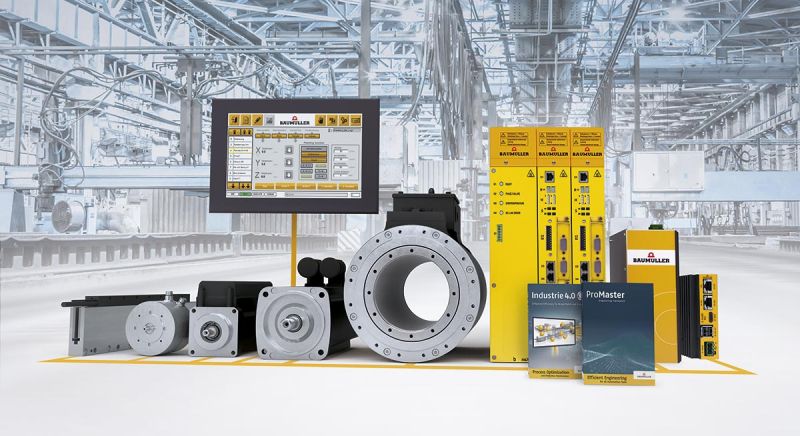Intelligent drive technology
Read min.

Everybody has been talking about intelligent drive technology for several years. The requirements of Industry 4.0 have initiated developments in drive technology that have now arrived in many production buildings. Completely new machine concepts are possible, maintenance and servicing are organized completely differently and processes become more flexible and faster.
Topics such as modularity, dynamics, precision and simplicity play an ever increasing role. In drive technology, the change has particularly affected the converters. They had to develop from pure speed controllers into intelligent servo-drives, which carry out diverse tasks in the system.
What does intelligence in the drive mean
Intelligence in the drive means that functions that traditionally took place in the central drive are now located in the servo-drive. Two central keywords are of significance: networkability and autonomy. Networkability: The drives can be networked with other actuators, sensors, central control elements and the cloud via bus systems. Autonomy: The drive itself is able to collect and process data locally, which has been recorded by itself or other components in the system. Based on this data, it is able to make decisions regarding actions or forward certain information. One advantage of this is that the operating data of the drive itself, i.e. the speed, power consumption, temperature, etc. which are recorded directly in the drive anyway, provide plenty of information that sheds light on the process quality and potential process optimizations.
For which requirements is it advisable to move the intelligence into the drive?
- Modularization
- Fieldbus at the boundary
- Simplification of PLC projects
- Fast response times

Modularization
Modularization is only possible due to intelligent drive technology. Machines increasingly have a modular structure and the different modules are produced in different locations. If the individual machine modules are encapsulated, the commissioning can take place separately, there is no need for commissioning of the overall system, for which all modules have to be in the same place. The higher-level control only communicates with the machine modules and no longer communicates with the individual system components.
Fieldbus at the boundary
Moving the intelligence into the drive can be the solution for devices in which the fieldbus communication is at its limits due to large quantities of data. If the data quantities that are communicated via the fieldbus become too large, then setpoints, for example, can no longer be transferred with the necessary speed, since the fieldbus cycle times have to be increased. Especially where very dynamic processes are involved, e.g. in the printing or packaging industry, this occurs at the expense of precision and dynamics and ultimate the productivity of the machine. If the intelligence is distributed decentrally, including to the drives, only preprocessed data or even only status messages are still sent via the fieldbus communication between the drive and central control unit. The actual setpoint and actual values of the motion control task are only sent within the machine module and can therefore be processed in far faster fieldbus cycles.
Webcast
Would you like to find out more about intelligence in the drive and data exchange in the system? Click here for our webcast “Data, data, data – relieve fieldbuses with drive intelligence!"
Simplification of PLC projects
Another advantage of decentralized intelligence is that the PLC projects become less complex. In a central control unit, all calculations are performed centrally, as the name implies. This begins with the starting up of the machine, continues with the calculation of all setpoint/actual values for each motor and ends with additional tasks such as the collection and processing of data for the IoT. If, on the other hand, the machine is modular, all tasks that only concern the individual machine module (setpoint/actual values, data collection and preprocessing, etc.), are calculated directly in the intelligent drive of the machine module. This results in extreme reduction of the PLC project’s complexity in the central control unit. The algorithms necessary for this are processed in the PLC project of the intelligent drive.
Fast response times
When it comes to safety, moving the intelligence into the drive has a another major advantage: Response time. If the safety functions are located directly in the drive, in the event of the triggering of STO, for example, due to excessively high speed, the fieldbus dead times (reaction times) no longer occur and the drive stops faster. The faster response times to an event (up to 11 ms is possible) can even lead to improvements in the machine’s speed and process cycle time, without increasing hazards at the machine. This in turn leads to higher machine productivity.
Even if it is not a question of safety, but merely the synchronization of many dynamic drives, it is advisable to avoid the fieldbus dead times and to implement control of the setpoint values directly via the drives.
Baumüller offers numerous solutions for intelligent drives. From scalable integrated safety functions to application-specific software, for example, for servo-hydraulic systems, through to an integrated PLC for extensive control and complex motion control tasks.

Karlheinz Wirsching
Product manager drives I Baumüller Nürnberg GmbH


